Critical Reflection on Nursing Practice: Analysis and Future
VerifiedAdded on 2022/09/17
|15
|4569
|18
Report
AI Summary
This report provides a critical reflection on a nursing practice incident, using Smith's model to guide the analysis. The incident involves a newly graduated nurse observing a doctor's breach of infection control protocols in an ICU surgical ward. The reflection explores the nurse's inaction due to hierarchical constraints and the influence of social learning theory, which emphasizes the adaptation to the behavior of others. The report delves into the ethical responsibilities of healthcare professionals regarding infection control, referencing the NMC code of conduct and relevant literature. It examines the impact of cultural disparities and hierarchical structures within the healthcare setting, which contributes to the nurse's silence. The analysis further considers the importance of effective communication, interprofessional collaboration, and mutual respect between nurses and doctors for patient-centered care. The report concludes with a discussion on the need for assertive communication, the value of integrating learning in practice, and the potential for improving patient outcomes through professional development and a more equitable healthcare environment.
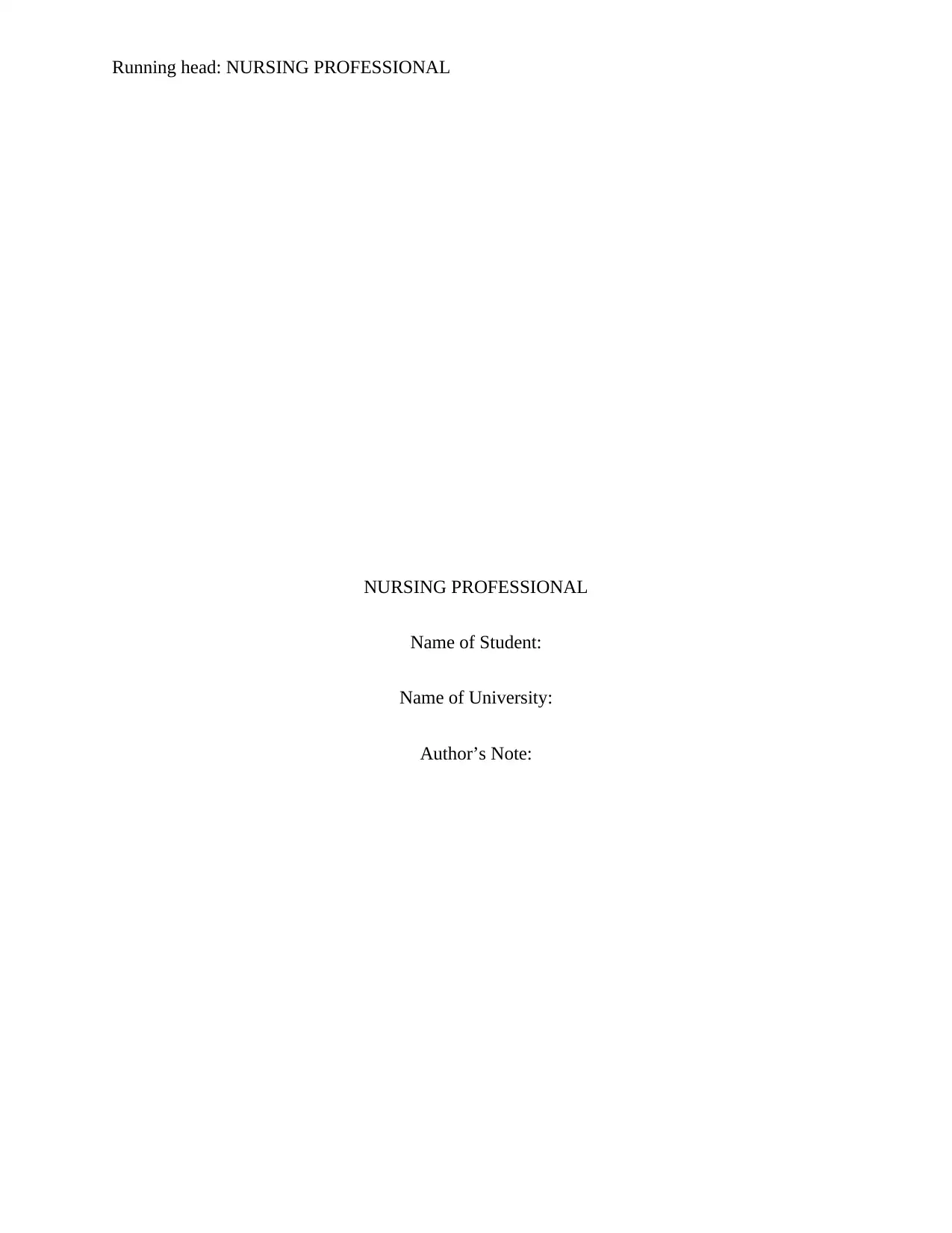
Running head: NURSING PROFESSIONAL
NURSING PROFESSIONAL
Name of Student:
Name of University:
Author’s Note:
NURSING PROFESSIONAL
Name of Student:
Name of University:
Author’s Note:
Paraphrase This Document
Need a fresh take? Get an instant paraphrase of this document with our AI Paraphraser
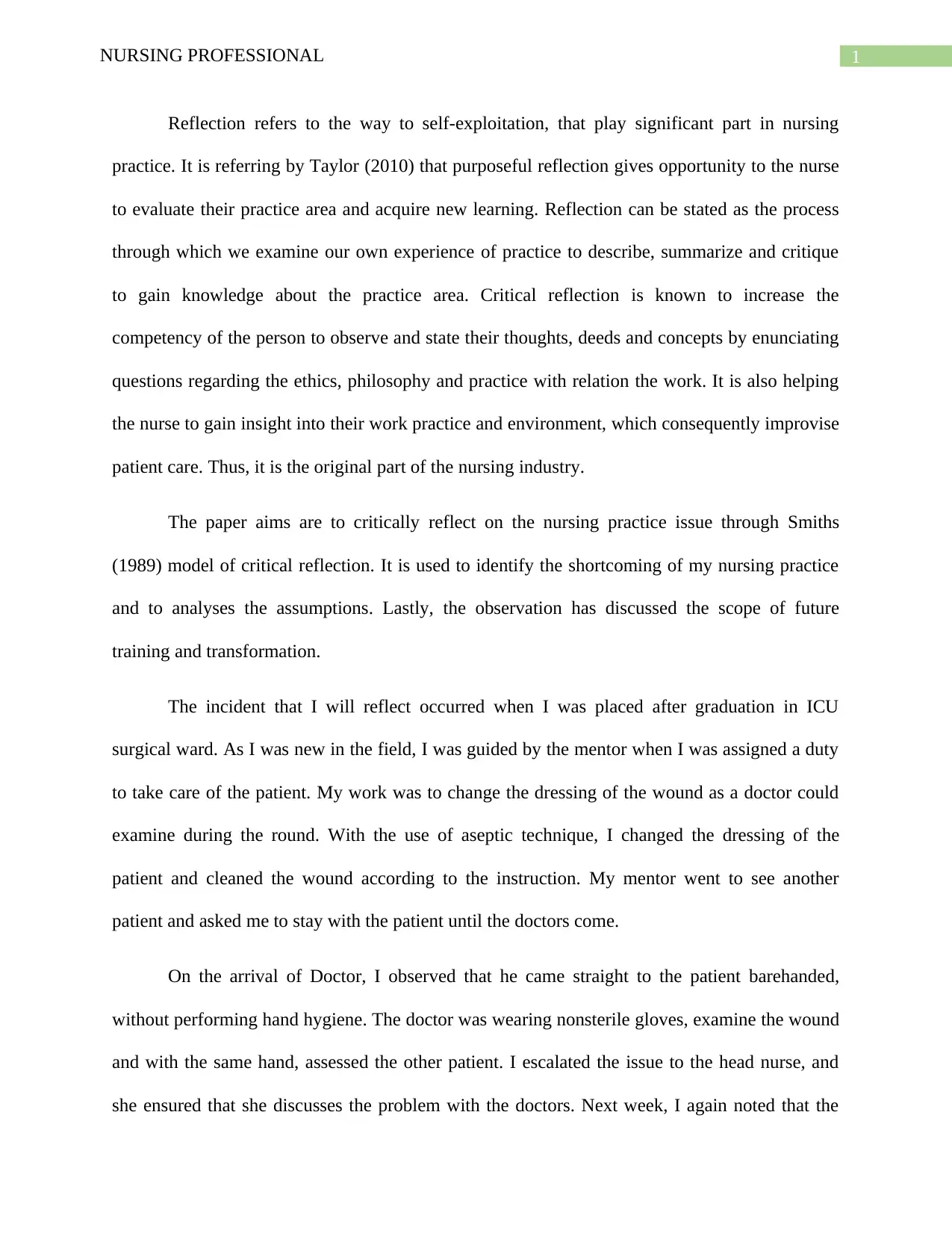
1NURSING PROFESSIONAL
Reflection refers to the way to self-exploitation, that play significant part in nursing
practice. It is referring by Taylor (2010) that purposeful reflection gives opportunity to the nurse
to evaluate their practice area and acquire new learning. Reflection can be stated as the process
through which we examine our own experience of practice to describe, summarize and critique
to gain knowledge about the practice area. Critical reflection is known to increase the
competency of the person to observe and state their thoughts, deeds and concepts by enunciating
questions regarding the ethics, philosophy and practice with relation the work. It is also helping
the nurse to gain insight into their work practice and environment, which consequently improvise
patient care. Thus, it is the original part of the nursing industry.
The paper aims are to critically reflect on the nursing practice issue through Smiths
(1989) model of critical reflection. It is used to identify the shortcoming of my nursing practice
and to analyses the assumptions. Lastly, the observation has discussed the scope of future
training and transformation.
The incident that I will reflect occurred when I was placed after graduation in ICU
surgical ward. As I was new in the field, I was guided by the mentor when I was assigned a duty
to take care of the patient. My work was to change the dressing of the wound as a doctor could
examine during the round. With the use of aseptic technique, I changed the dressing of the
patient and cleaned the wound according to the instruction. My mentor went to see another
patient and asked me to stay with the patient until the doctors come.
On the arrival of Doctor, I observed that he came straight to the patient barehanded,
without performing hand hygiene. The doctor was wearing nonsterile gloves, examine the wound
and with the same hand, assessed the other patient. I escalated the issue to the head nurse, and
she ensured that she discusses the problem with the doctors. Next week, I again noted that the
Reflection refers to the way to self-exploitation, that play significant part in nursing
practice. It is referring by Taylor (2010) that purposeful reflection gives opportunity to the nurse
to evaluate their practice area and acquire new learning. Reflection can be stated as the process
through which we examine our own experience of practice to describe, summarize and critique
to gain knowledge about the practice area. Critical reflection is known to increase the
competency of the person to observe and state their thoughts, deeds and concepts by enunciating
questions regarding the ethics, philosophy and practice with relation the work. It is also helping
the nurse to gain insight into their work practice and environment, which consequently improvise
patient care. Thus, it is the original part of the nursing industry.
The paper aims are to critically reflect on the nursing practice issue through Smiths
(1989) model of critical reflection. It is used to identify the shortcoming of my nursing practice
and to analyses the assumptions. Lastly, the observation has discussed the scope of future
training and transformation.
The incident that I will reflect occurred when I was placed after graduation in ICU
surgical ward. As I was new in the field, I was guided by the mentor when I was assigned a duty
to take care of the patient. My work was to change the dressing of the wound as a doctor could
examine during the round. With the use of aseptic technique, I changed the dressing of the
patient and cleaned the wound according to the instruction. My mentor went to see another
patient and asked me to stay with the patient until the doctors come.
On the arrival of Doctor, I observed that he came straight to the patient barehanded,
without performing hand hygiene. The doctor was wearing nonsterile gloves, examine the wound
and with the same hand, assessed the other patient. I escalated the issue to the head nurse, and
she ensured that she discusses the problem with the doctors. Next week, I again noted that the
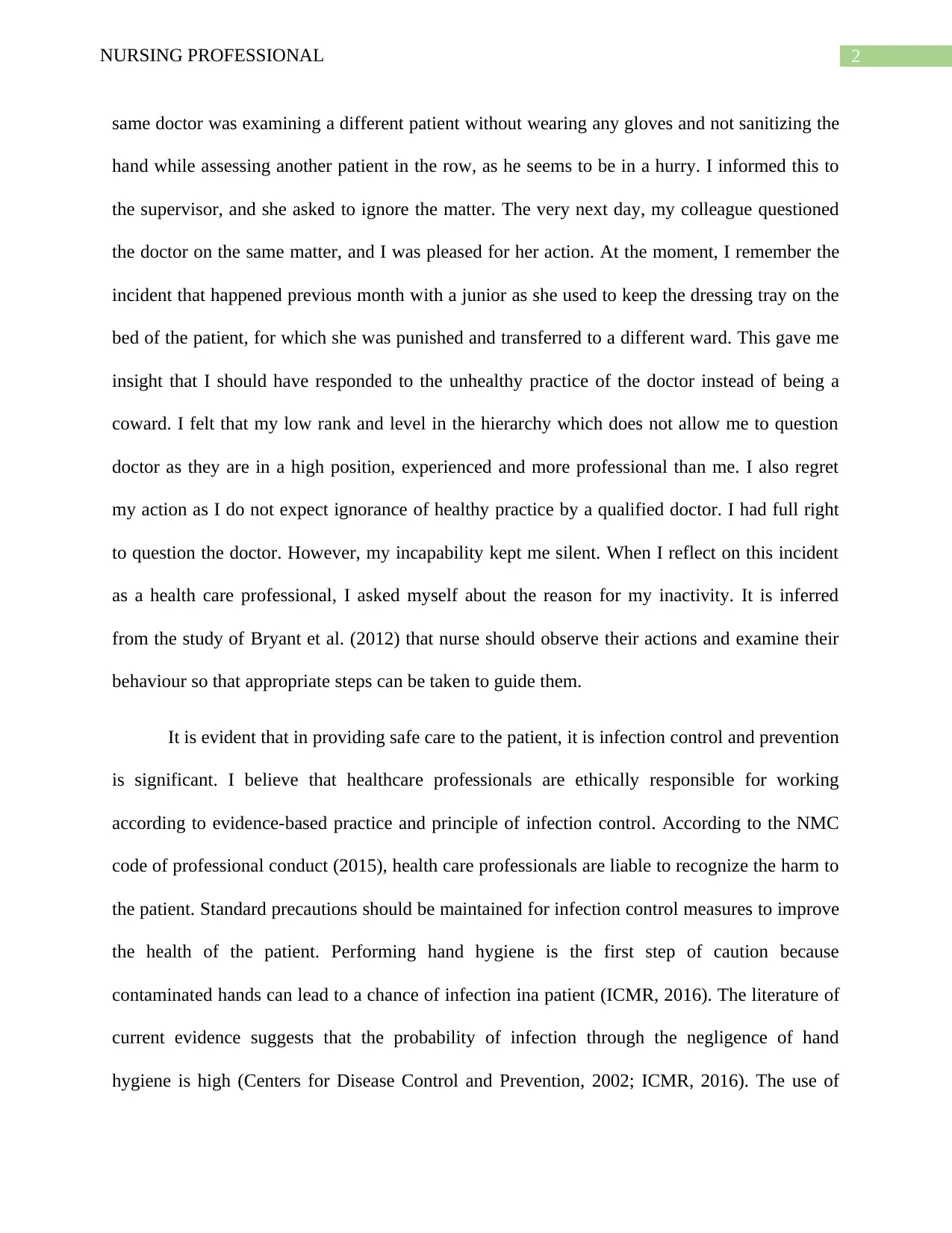
2NURSING PROFESSIONAL
same doctor was examining a different patient without wearing any gloves and not sanitizing the
hand while assessing another patient in the row, as he seems to be in a hurry. I informed this to
the supervisor, and she asked to ignore the matter. The very next day, my colleague questioned
the doctor on the same matter, and I was pleased for her action. At the moment, I remember the
incident that happened previous month with a junior as she used to keep the dressing tray on the
bed of the patient, for which she was punished and transferred to a different ward. This gave me
insight that I should have responded to the unhealthy practice of the doctor instead of being a
coward. I felt that my low rank and level in the hierarchy which does not allow me to question
doctor as they are in a high position, experienced and more professional than me. I also regret
my action as I do not expect ignorance of healthy practice by a qualified doctor. I had full right
to question the doctor. However, my incapability kept me silent. When I reflect on this incident
as a health care professional, I asked myself about the reason for my inactivity. It is inferred
from the study of Bryant et al. (2012) that nurse should observe their actions and examine their
behaviour so that appropriate steps can be taken to guide them.
It is evident that in providing safe care to the patient, it is infection control and prevention
is significant. I believe that healthcare professionals are ethically responsible for working
according to evidence-based practice and principle of infection control. According to the NMC
code of professional conduct (2015), health care professionals are liable to recognize the harm to
the patient. Standard precautions should be maintained for infection control measures to improve
the health of the patient. Performing hand hygiene is the first step of caution because
contaminated hands can lead to a chance of infection ina patient (ICMR, 2016). The literature of
current evidence suggests that the probability of infection through the negligence of hand
hygiene is high (Centers for Disease Control and Prevention, 2002; ICMR, 2016). The use of
same doctor was examining a different patient without wearing any gloves and not sanitizing the
hand while assessing another patient in the row, as he seems to be in a hurry. I informed this to
the supervisor, and she asked to ignore the matter. The very next day, my colleague questioned
the doctor on the same matter, and I was pleased for her action. At the moment, I remember the
incident that happened previous month with a junior as she used to keep the dressing tray on the
bed of the patient, for which she was punished and transferred to a different ward. This gave me
insight that I should have responded to the unhealthy practice of the doctor instead of being a
coward. I felt that my low rank and level in the hierarchy which does not allow me to question
doctor as they are in a high position, experienced and more professional than me. I also regret
my action as I do not expect ignorance of healthy practice by a qualified doctor. I had full right
to question the doctor. However, my incapability kept me silent. When I reflect on this incident
as a health care professional, I asked myself about the reason for my inactivity. It is inferred
from the study of Bryant et al. (2012) that nurse should observe their actions and examine their
behaviour so that appropriate steps can be taken to guide them.
It is evident that in providing safe care to the patient, it is infection control and prevention
is significant. I believe that healthcare professionals are ethically responsible for working
according to evidence-based practice and principle of infection control. According to the NMC
code of professional conduct (2015), health care professionals are liable to recognize the harm to
the patient. Standard precautions should be maintained for infection control measures to improve
the health of the patient. Performing hand hygiene is the first step of caution because
contaminated hands can lead to a chance of infection ina patient (ICMR, 2016). The literature of
current evidence suggests that the probability of infection through the negligence of hand
hygiene is high (Centers for Disease Control and Prevention, 2002; ICMR, 2016). The use of
⊘ This is a preview!⊘
Do you want full access?
Subscribe today to unlock all pages.

Trusted by 1+ million students worldwide
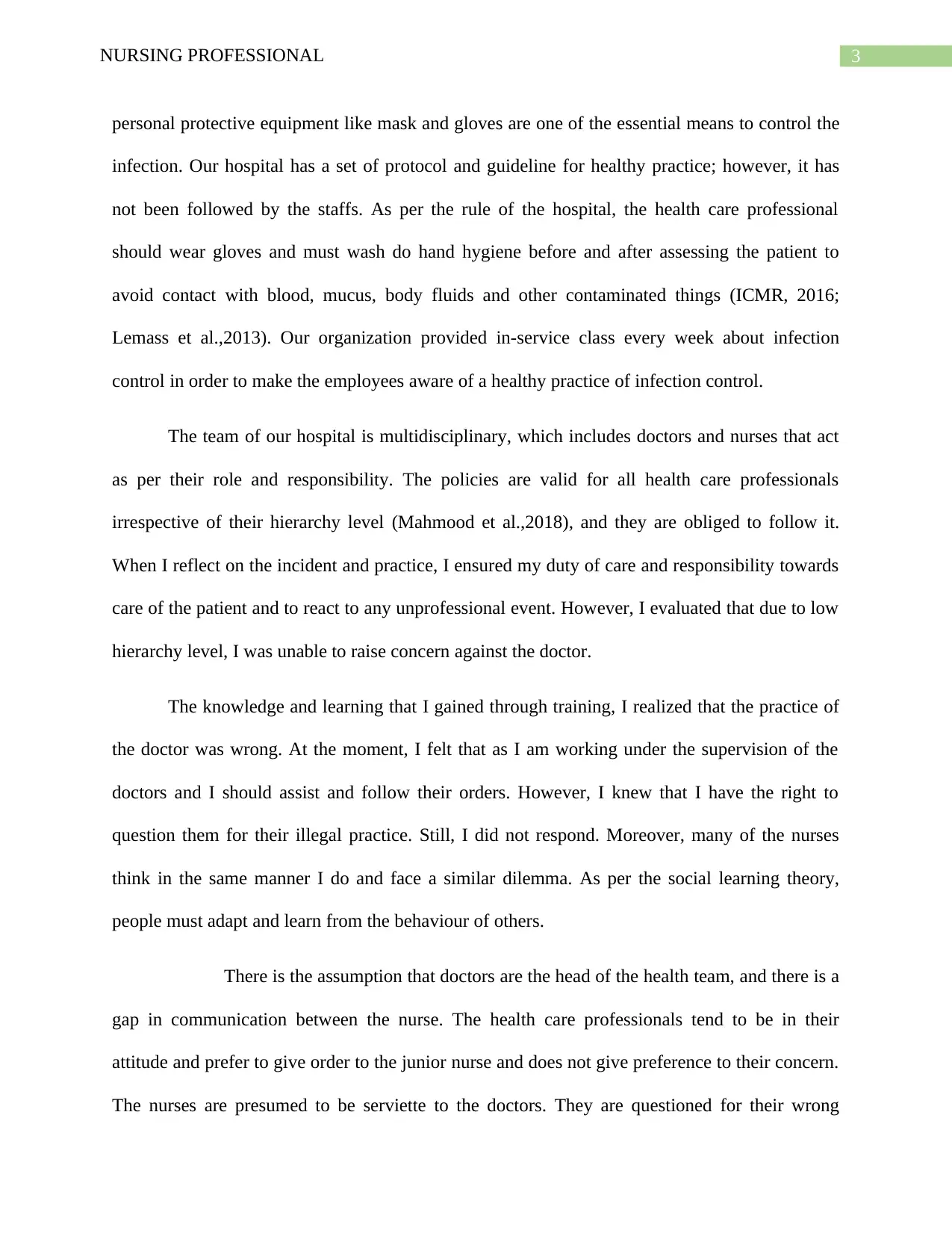
3NURSING PROFESSIONAL
personal protective equipment like mask and gloves are one of the essential means to control the
infection. Our hospital has a set of protocol and guideline for healthy practice; however, it has
not been followed by the staffs. As per the rule of the hospital, the health care professional
should wear gloves and must wash do hand hygiene before and after assessing the patient to
avoid contact with blood, mucus, body fluids and other contaminated things (ICMR, 2016;
Lemass et al.,2013). Our organization provided in-service class every week about infection
control in order to make the employees aware of a healthy practice of infection control.
The team of our hospital is multidisciplinary, which includes doctors and nurses that act
as per their role and responsibility. The policies are valid for all health care professionals
irrespective of their hierarchy level (Mahmood et al.,2018), and they are obliged to follow it.
When I reflect on the incident and practice, I ensured my duty of care and responsibility towards
care of the patient and to react to any unprofessional event. However, I evaluated that due to low
hierarchy level, I was unable to raise concern against the doctor.
The knowledge and learning that I gained through training, I realized that the practice of
the doctor was wrong. At the moment, I felt that as I am working under the supervision of the
doctors and I should assist and follow their orders. However, I knew that I have the right to
question them for their illegal practice. Still, I did not respond. Moreover, many of the nurses
think in the same manner I do and face a similar dilemma. As per the social learning theory,
people must adapt and learn from the behaviour of others.
There is the assumption that doctors are the head of the health team, and there is a
gap in communication between the nurse. The health care professionals tend to be in their
attitude and prefer to give order to the junior nurse and does not give preference to their concern.
The nurses are presumed to be serviette to the doctors. They are questioned for their wrong
personal protective equipment like mask and gloves are one of the essential means to control the
infection. Our hospital has a set of protocol and guideline for healthy practice; however, it has
not been followed by the staffs. As per the rule of the hospital, the health care professional
should wear gloves and must wash do hand hygiene before and after assessing the patient to
avoid contact with blood, mucus, body fluids and other contaminated things (ICMR, 2016;
Lemass et al.,2013). Our organization provided in-service class every week about infection
control in order to make the employees aware of a healthy practice of infection control.
The team of our hospital is multidisciplinary, which includes doctors and nurses that act
as per their role and responsibility. The policies are valid for all health care professionals
irrespective of their hierarchy level (Mahmood et al.,2018), and they are obliged to follow it.
When I reflect on the incident and practice, I ensured my duty of care and responsibility towards
care of the patient and to react to any unprofessional event. However, I evaluated that due to low
hierarchy level, I was unable to raise concern against the doctor.
The knowledge and learning that I gained through training, I realized that the practice of
the doctor was wrong. At the moment, I felt that as I am working under the supervision of the
doctors and I should assist and follow their orders. However, I knew that I have the right to
question them for their illegal practice. Still, I did not respond. Moreover, many of the nurses
think in the same manner I do and face a similar dilemma. As per the social learning theory,
people must adapt and learn from the behaviour of others.
There is the assumption that doctors are the head of the health team, and there is a
gap in communication between the nurse. The health care professionals tend to be in their
attitude and prefer to give order to the junior nurse and does not give preference to their concern.
The nurses are presumed to be serviette to the doctors. They are questioned for their wrong
Paraphrase This Document
Need a fresh take? Get an instant paraphrase of this document with our AI Paraphraser
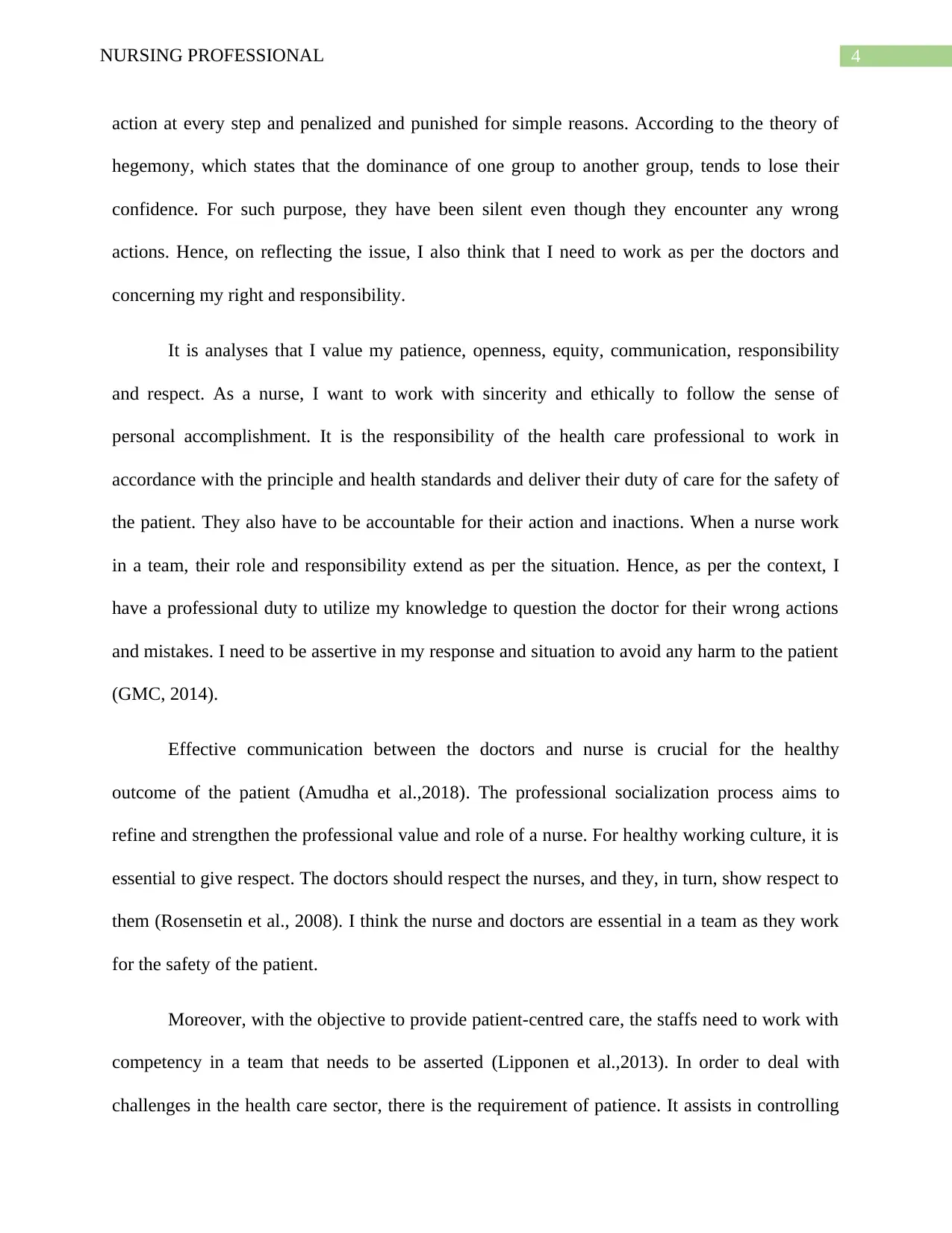
4NURSING PROFESSIONAL
action at every step and penalized and punished for simple reasons. According to the theory of
hegemony, which states that the dominance of one group to another group, tends to lose their
confidence. For such purpose, they have been silent even though they encounter any wrong
actions. Hence, on reflecting the issue, I also think that I need to work as per the doctors and
concerning my right and responsibility.
It is analyses that I value my patience, openness, equity, communication, responsibility
and respect. As a nurse, I want to work with sincerity and ethically to follow the sense of
personal accomplishment. It is the responsibility of the health care professional to work in
accordance with the principle and health standards and deliver their duty of care for the safety of
the patient. They also have to be accountable for their action and inactions. When a nurse work
in a team, their role and responsibility extend as per the situation. Hence, as per the context, I
have a professional duty to utilize my knowledge to question the doctor for their wrong actions
and mistakes. I need to be assertive in my response and situation to avoid any harm to the patient
(GMC, 2014).
Effective communication between the doctors and nurse is crucial for the healthy
outcome of the patient (Amudha et al.,2018). The professional socialization process aims to
refine and strengthen the professional value and role of a nurse. For healthy working culture, it is
essential to give respect. The doctors should respect the nurses, and they, in turn, show respect to
them (Rosensetin et al., 2008). I think the nurse and doctors are essential in a team as they work
for the safety of the patient.
Moreover, with the objective to provide patient-centred care, the staffs need to work with
competency in a team that needs to be asserted (Lipponen et al.,2013). In order to deal with
challenges in the health care sector, there is the requirement of patience. It assists in controlling
action at every step and penalized and punished for simple reasons. According to the theory of
hegemony, which states that the dominance of one group to another group, tends to lose their
confidence. For such purpose, they have been silent even though they encounter any wrong
actions. Hence, on reflecting the issue, I also think that I need to work as per the doctors and
concerning my right and responsibility.
It is analyses that I value my patience, openness, equity, communication, responsibility
and respect. As a nurse, I want to work with sincerity and ethically to follow the sense of
personal accomplishment. It is the responsibility of the health care professional to work in
accordance with the principle and health standards and deliver their duty of care for the safety of
the patient. They also have to be accountable for their action and inactions. When a nurse work
in a team, their role and responsibility extend as per the situation. Hence, as per the context, I
have a professional duty to utilize my knowledge to question the doctor for their wrong actions
and mistakes. I need to be assertive in my response and situation to avoid any harm to the patient
(GMC, 2014).
Effective communication between the doctors and nurse is crucial for the healthy
outcome of the patient (Amudha et al.,2018). The professional socialization process aims to
refine and strengthen the professional value and role of a nurse. For healthy working culture, it is
essential to give respect. The doctors should respect the nurses, and they, in turn, show respect to
them (Rosensetin et al., 2008). I think the nurse and doctors are essential in a team as they work
for the safety of the patient.
Moreover, with the objective to provide patient-centred care, the staffs need to work with
competency in a team that needs to be asserted (Lipponen et al.,2013). In order to deal with
challenges in the health care sector, there is the requirement of patience. It assists in controlling
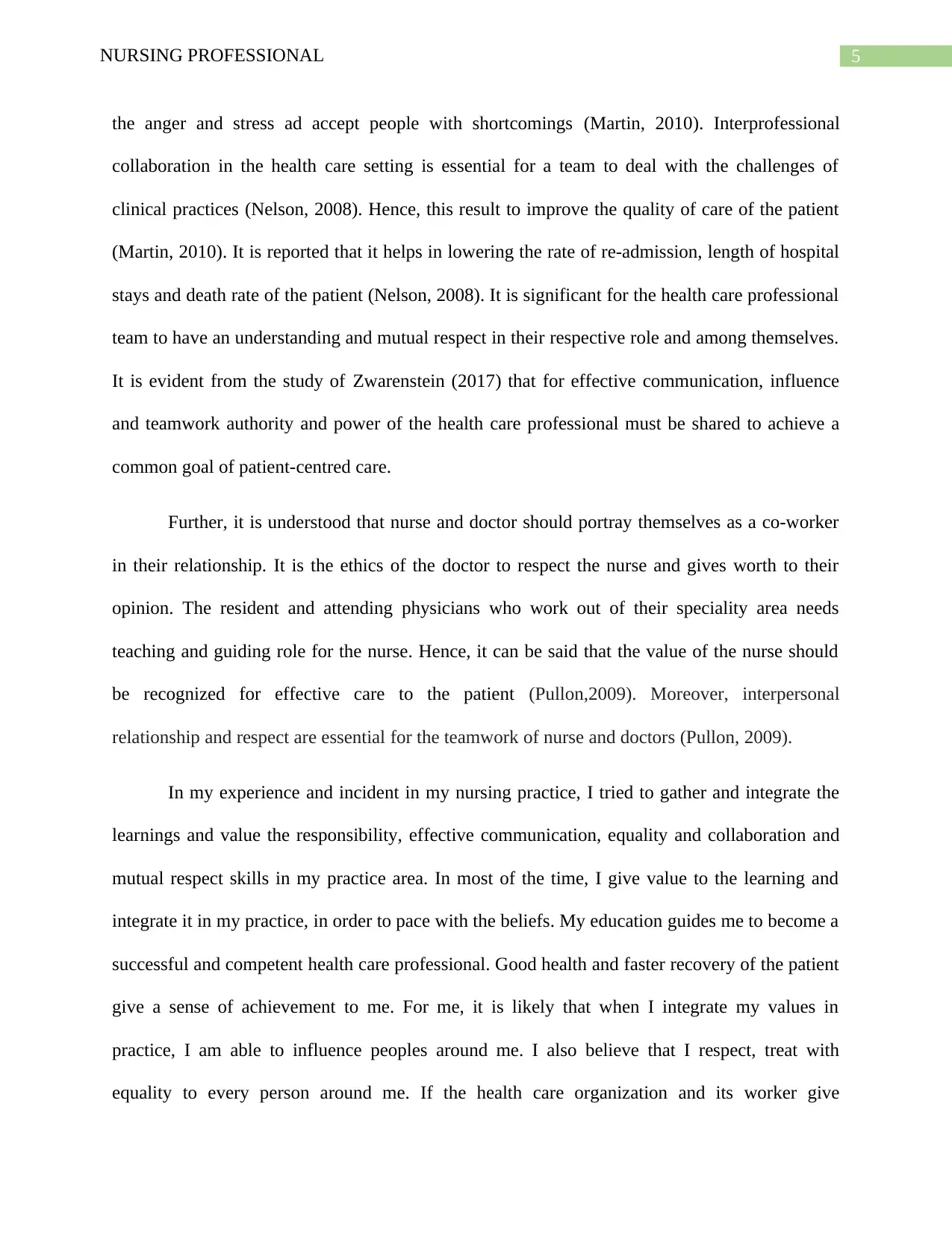
5NURSING PROFESSIONAL
the anger and stress ad accept people with shortcomings (Martin, 2010). Interprofessional
collaboration in the health care setting is essential for a team to deal with the challenges of
clinical practices (Nelson, 2008). Hence, this result to improve the quality of care of the patient
(Martin, 2010). It is reported that it helps in lowering the rate of re-admission, length of hospital
stays and death rate of the patient (Nelson, 2008). It is significant for the health care professional
team to have an understanding and mutual respect in their respective role and among themselves.
It is evident from the study of Zwarenstein (2017) that for effective communication, influence
and teamwork authority and power of the health care professional must be shared to achieve a
common goal of patient-centred care.
Further, it is understood that nurse and doctor should portray themselves as a co-worker
in their relationship. It is the ethics of the doctor to respect the nurse and gives worth to their
opinion. The resident and attending physicians who work out of their speciality area needs
teaching and guiding role for the nurse. Hence, it can be said that the value of the nurse should
be recognized for effective care to the patient (Pullon,2009). Moreover, interpersonal
relationship and respect are essential for the teamwork of nurse and doctors (Pullon, 2009).
In my experience and incident in my nursing practice, I tried to gather and integrate the
learnings and value the responsibility, effective communication, equality and collaboration and
mutual respect skills in my practice area. In most of the time, I give value to the learning and
integrate it in my practice, in order to pace with the beliefs. My education guides me to become a
successful and competent health care professional. Good health and faster recovery of the patient
give a sense of achievement to me. For me, it is likely that when I integrate my values in
practice, I am able to influence peoples around me. I also believe that I respect, treat with
equality to every person around me. If the health care organization and its worker give
the anger and stress ad accept people with shortcomings (Martin, 2010). Interprofessional
collaboration in the health care setting is essential for a team to deal with the challenges of
clinical practices (Nelson, 2008). Hence, this result to improve the quality of care of the patient
(Martin, 2010). It is reported that it helps in lowering the rate of re-admission, length of hospital
stays and death rate of the patient (Nelson, 2008). It is significant for the health care professional
team to have an understanding and mutual respect in their respective role and among themselves.
It is evident from the study of Zwarenstein (2017) that for effective communication, influence
and teamwork authority and power of the health care professional must be shared to achieve a
common goal of patient-centred care.
Further, it is understood that nurse and doctor should portray themselves as a co-worker
in their relationship. It is the ethics of the doctor to respect the nurse and gives worth to their
opinion. The resident and attending physicians who work out of their speciality area needs
teaching and guiding role for the nurse. Hence, it can be said that the value of the nurse should
be recognized for effective care to the patient (Pullon,2009). Moreover, interpersonal
relationship and respect are essential for the teamwork of nurse and doctors (Pullon, 2009).
In my experience and incident in my nursing practice, I tried to gather and integrate the
learnings and value the responsibility, effective communication, equality and collaboration and
mutual respect skills in my practice area. In most of the time, I give value to the learning and
integrate it in my practice, in order to pace with the beliefs. My education guides me to become a
successful and competent health care professional. Good health and faster recovery of the patient
give a sense of achievement to me. For me, it is likely that when I integrate my values in
practice, I am able to influence peoples around me. I also believe that I respect, treat with
equality to every person around me. If the health care organization and its worker give
⊘ This is a preview!⊘
Do you want full access?
Subscribe today to unlock all pages.

Trusted by 1+ million students worldwide
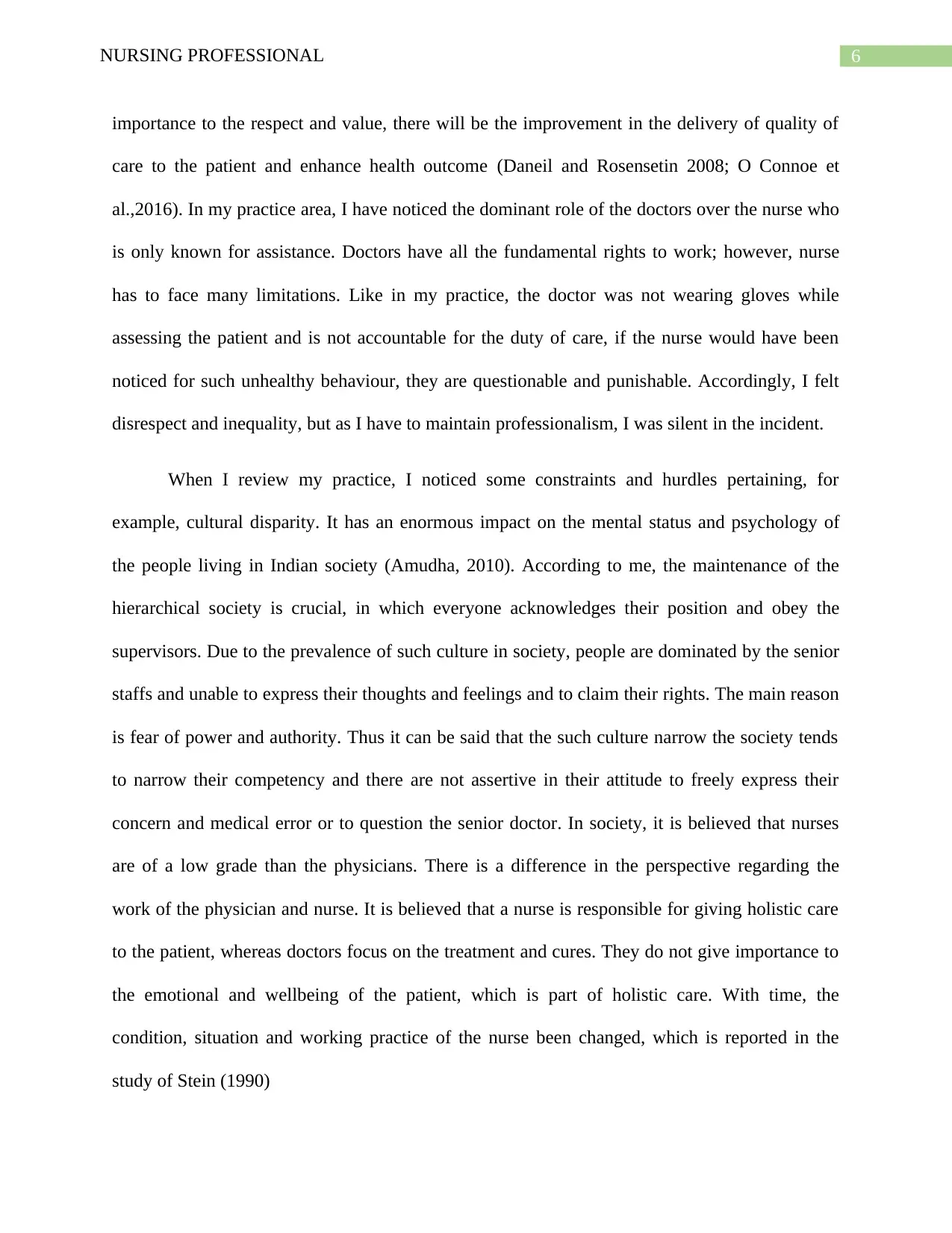
6NURSING PROFESSIONAL
importance to the respect and value, there will be the improvement in the delivery of quality of
care to the patient and enhance health outcome (Daneil and Rosensetin 2008; O Connoe et
al.,2016). In my practice area, I have noticed the dominant role of the doctors over the nurse who
is only known for assistance. Doctors have all the fundamental rights to work; however, nurse
has to face many limitations. Like in my practice, the doctor was not wearing gloves while
assessing the patient and is not accountable for the duty of care, if the nurse would have been
noticed for such unhealthy behaviour, they are questionable and punishable. Accordingly, I felt
disrespect and inequality, but as I have to maintain professionalism, I was silent in the incident.
When I review my practice, I noticed some constraints and hurdles pertaining, for
example, cultural disparity. It has an enormous impact on the mental status and psychology of
the people living in Indian society (Amudha, 2010). According to me, the maintenance of the
hierarchical society is crucial, in which everyone acknowledges their position and obey the
supervisors. Due to the prevalence of such culture in society, people are dominated by the senior
staffs and unable to express their thoughts and feelings and to claim their rights. The main reason
is fear of power and authority. Thus it can be said that the such culture narrow the society tends
to narrow their competency and there are not assertive in their attitude to freely express their
concern and medical error or to question the senior doctor. In society, it is believed that nurses
are of a low grade than the physicians. There is a difference in the perspective regarding the
work of the physician and nurse. It is believed that a nurse is responsible for giving holistic care
to the patient, whereas doctors focus on the treatment and cures. They do not give importance to
the emotional and wellbeing of the patient, which is part of holistic care. With time, the
condition, situation and working practice of the nurse been changed, which is reported in the
study of Stein (1990)
importance to the respect and value, there will be the improvement in the delivery of quality of
care to the patient and enhance health outcome (Daneil and Rosensetin 2008; O Connoe et
al.,2016). In my practice area, I have noticed the dominant role of the doctors over the nurse who
is only known for assistance. Doctors have all the fundamental rights to work; however, nurse
has to face many limitations. Like in my practice, the doctor was not wearing gloves while
assessing the patient and is not accountable for the duty of care, if the nurse would have been
noticed for such unhealthy behaviour, they are questionable and punishable. Accordingly, I felt
disrespect and inequality, but as I have to maintain professionalism, I was silent in the incident.
When I review my practice, I noticed some constraints and hurdles pertaining, for
example, cultural disparity. It has an enormous impact on the mental status and psychology of
the people living in Indian society (Amudha, 2010). According to me, the maintenance of the
hierarchical society is crucial, in which everyone acknowledges their position and obey the
supervisors. Due to the prevalence of such culture in society, people are dominated by the senior
staffs and unable to express their thoughts and feelings and to claim their rights. The main reason
is fear of power and authority. Thus it can be said that the such culture narrow the society tends
to narrow their competency and there are not assertive in their attitude to freely express their
concern and medical error or to question the senior doctor. In society, it is believed that nurses
are of a low grade than the physicians. There is a difference in the perspective regarding the
work of the physician and nurse. It is believed that a nurse is responsible for giving holistic care
to the patient, whereas doctors focus on the treatment and cures. They do not give importance to
the emotional and wellbeing of the patient, which is part of holistic care. With time, the
condition, situation and working practice of the nurse been changed, which is reported in the
study of Stein (1990)
Paraphrase This Document
Need a fresh take? Get an instant paraphrase of this document with our AI Paraphraser
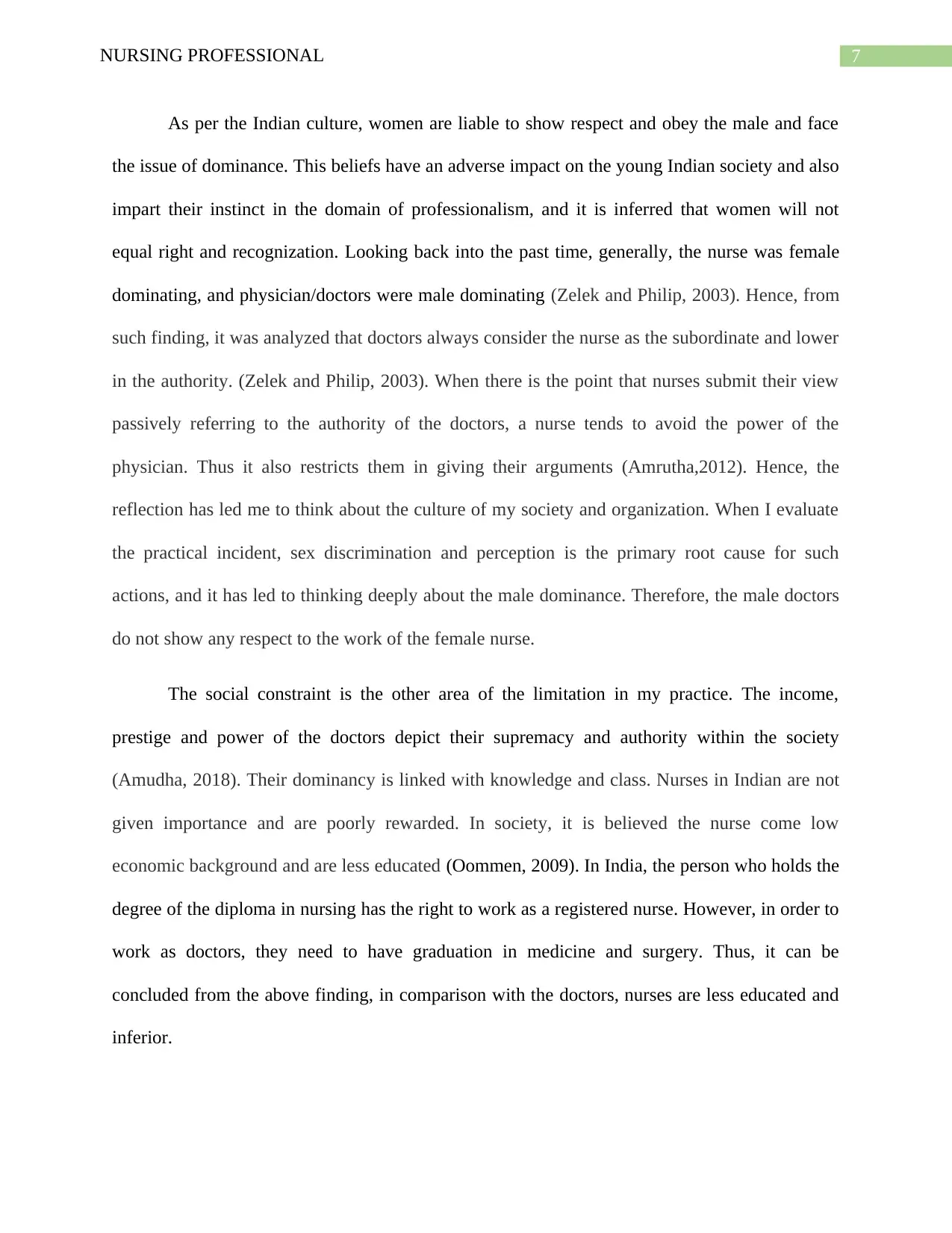
7NURSING PROFESSIONAL
As per the Indian culture, women are liable to show respect and obey the male and face
the issue of dominance. This beliefs have an adverse impact on the young Indian society and also
impart their instinct in the domain of professionalism, and it is inferred that women will not
equal right and recognization. Looking back into the past time, generally, the nurse was female
dominating, and physician/doctors were male dominating (Zelek and Philip, 2003). Hence, from
such finding, it was analyzed that doctors always consider the nurse as the subordinate and lower
in the authority. (Zelek and Philip, 2003). When there is the point that nurses submit their view
passively referring to the authority of the doctors, a nurse tends to avoid the power of the
physician. Thus it also restricts them in giving their arguments (Amrutha,2012). Hence, the
reflection has led me to think about the culture of my society and organization. When I evaluate
the practical incident, sex discrimination and perception is the primary root cause for such
actions, and it has led to thinking deeply about the male dominance. Therefore, the male doctors
do not show any respect to the work of the female nurse.
The social constraint is the other area of the limitation in my practice. The income,
prestige and power of the doctors depict their supremacy and authority within the society
(Amudha, 2018). Their dominancy is linked with knowledge and class. Nurses in Indian are not
given importance and are poorly rewarded. In society, it is believed the nurse come low
economic background and are less educated (Oommen, 2009). In India, the person who holds the
degree of the diploma in nursing has the right to work as a registered nurse. However, in order to
work as doctors, they need to have graduation in medicine and surgery. Thus, it can be
concluded from the above finding, in comparison with the doctors, nurses are less educated and
inferior.
As per the Indian culture, women are liable to show respect and obey the male and face
the issue of dominance. This beliefs have an adverse impact on the young Indian society and also
impart their instinct in the domain of professionalism, and it is inferred that women will not
equal right and recognization. Looking back into the past time, generally, the nurse was female
dominating, and physician/doctors were male dominating (Zelek and Philip, 2003). Hence, from
such finding, it was analyzed that doctors always consider the nurse as the subordinate and lower
in the authority. (Zelek and Philip, 2003). When there is the point that nurses submit their view
passively referring to the authority of the doctors, a nurse tends to avoid the power of the
physician. Thus it also restricts them in giving their arguments (Amrutha,2012). Hence, the
reflection has led me to think about the culture of my society and organization. When I evaluate
the practical incident, sex discrimination and perception is the primary root cause for such
actions, and it has led to thinking deeply about the male dominance. Therefore, the male doctors
do not show any respect to the work of the female nurse.
The social constraint is the other area of the limitation in my practice. The income,
prestige and power of the doctors depict their supremacy and authority within the society
(Amudha, 2018). Their dominancy is linked with knowledge and class. Nurses in Indian are not
given importance and are poorly rewarded. In society, it is believed the nurse come low
economic background and are less educated (Oommen, 2009). In India, the person who holds the
degree of the diploma in nursing has the right to work as a registered nurse. However, in order to
work as doctors, they need to have graduation in medicine and surgery. Thus, it can be
concluded from the above finding, in comparison with the doctors, nurses are less educated and
inferior.
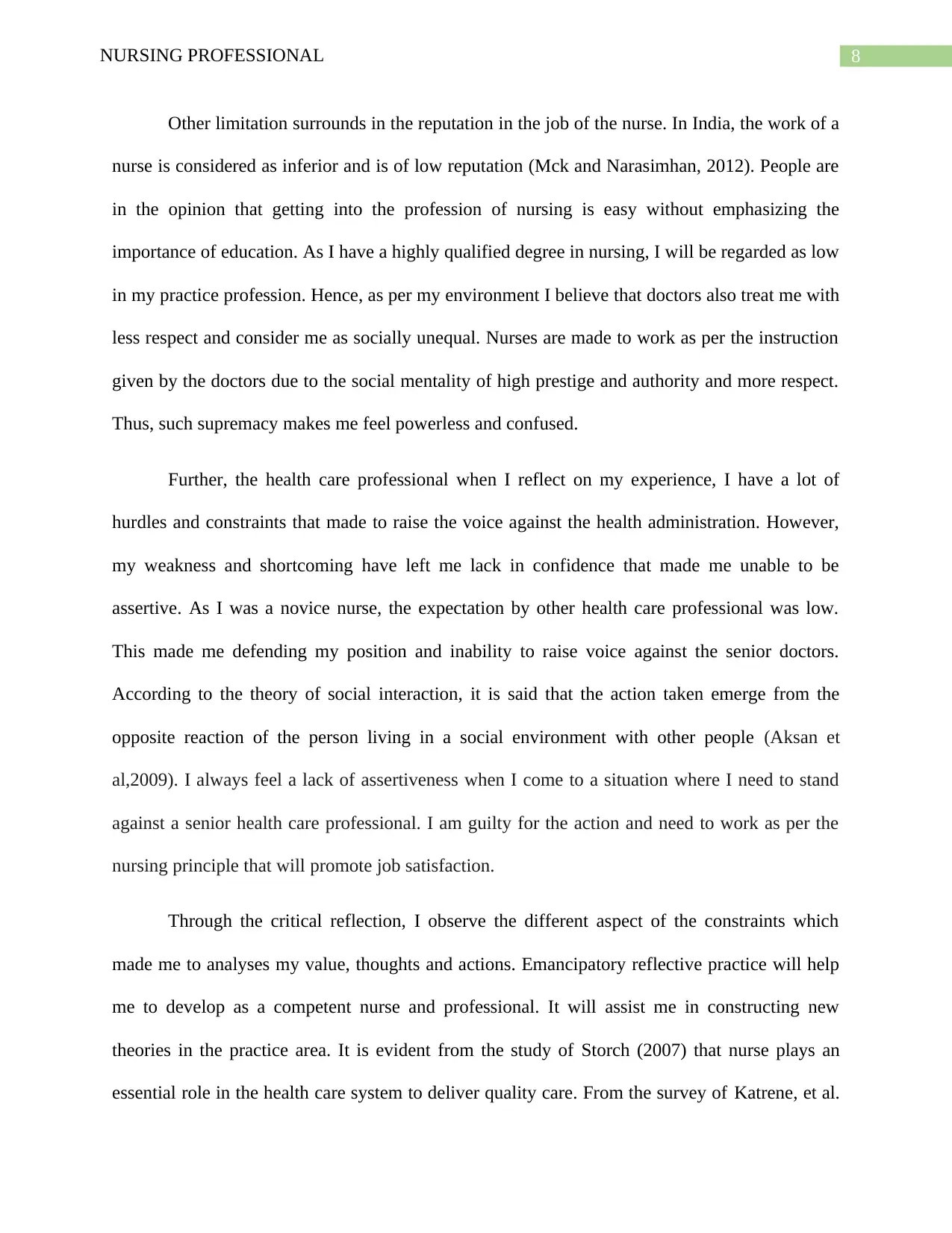
8NURSING PROFESSIONAL
Other limitation surrounds in the reputation in the job of the nurse. In India, the work of a
nurse is considered as inferior and is of low reputation (Mck and Narasimhan, 2012). People are
in the opinion that getting into the profession of nursing is easy without emphasizing the
importance of education. As I have a highly qualified degree in nursing, I will be regarded as low
in my practice profession. Hence, as per my environment I believe that doctors also treat me with
less respect and consider me as socially unequal. Nurses are made to work as per the instruction
given by the doctors due to the social mentality of high prestige and authority and more respect.
Thus, such supremacy makes me feel powerless and confused.
Further, the health care professional when I reflect on my experience, I have a lot of
hurdles and constraints that made to raise the voice against the health administration. However,
my weakness and shortcoming have left me lack in confidence that made me unable to be
assertive. As I was a novice nurse, the expectation by other health care professional was low.
This made me defending my position and inability to raise voice against the senior doctors.
According to the theory of social interaction, it is said that the action taken emerge from the
opposite reaction of the person living in a social environment with other people (Aksan et
al,2009). I always feel a lack of assertiveness when I come to a situation where I need to stand
against a senior health care professional. I am guilty for the action and need to work as per the
nursing principle that will promote job satisfaction.
Through the critical reflection, I observe the different aspect of the constraints which
made me to analyses my value, thoughts and actions. Emancipatory reflective practice will help
me to develop as a competent nurse and professional. It will assist me in constructing new
theories in the practice area. It is evident from the study of Storch (2007) that nurse plays an
essential role in the health care system to deliver quality care. From the survey of Katrene, et al.
Other limitation surrounds in the reputation in the job of the nurse. In India, the work of a
nurse is considered as inferior and is of low reputation (Mck and Narasimhan, 2012). People are
in the opinion that getting into the profession of nursing is easy without emphasizing the
importance of education. As I have a highly qualified degree in nursing, I will be regarded as low
in my practice profession. Hence, as per my environment I believe that doctors also treat me with
less respect and consider me as socially unequal. Nurses are made to work as per the instruction
given by the doctors due to the social mentality of high prestige and authority and more respect.
Thus, such supremacy makes me feel powerless and confused.
Further, the health care professional when I reflect on my experience, I have a lot of
hurdles and constraints that made to raise the voice against the health administration. However,
my weakness and shortcoming have left me lack in confidence that made me unable to be
assertive. As I was a novice nurse, the expectation by other health care professional was low.
This made me defending my position and inability to raise voice against the senior doctors.
According to the theory of social interaction, it is said that the action taken emerge from the
opposite reaction of the person living in a social environment with other people (Aksan et
al,2009). I always feel a lack of assertiveness when I come to a situation where I need to stand
against a senior health care professional. I am guilty for the action and need to work as per the
nursing principle that will promote job satisfaction.
Through the critical reflection, I observe the different aspect of the constraints which
made me to analyses my value, thoughts and actions. Emancipatory reflective practice will help
me to develop as a competent nurse and professional. It will assist me in constructing new
theories in the practice area. It is evident from the study of Storch (2007) that nurse plays an
essential role in the health care system to deliver quality care. From the survey of Katrene, et al.
⊘ This is a preview!⊘
Do you want full access?
Subscribe today to unlock all pages.

Trusted by 1+ million students worldwide
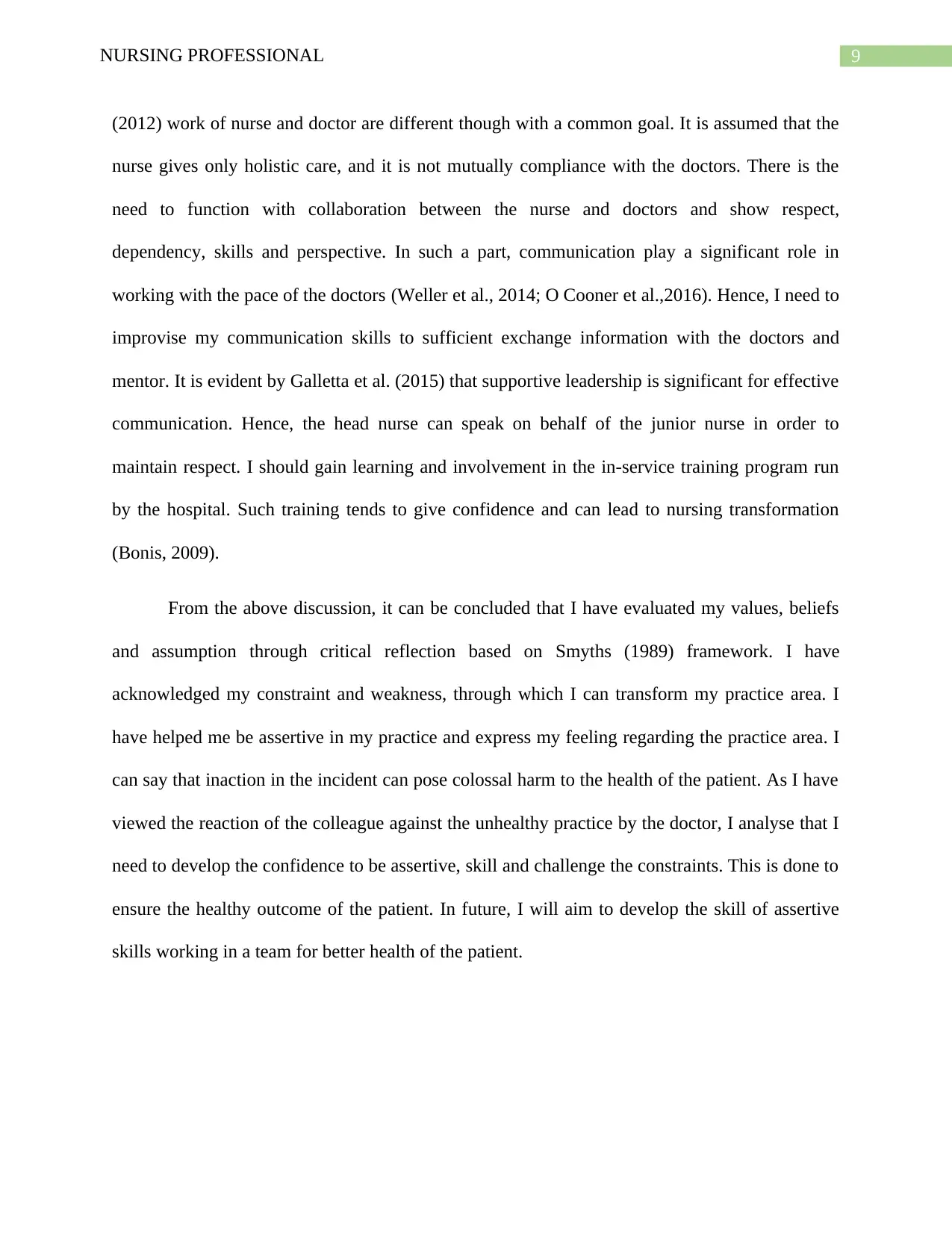
9NURSING PROFESSIONAL
(2012) work of nurse and doctor are different though with a common goal. It is assumed that the
nurse gives only holistic care, and it is not mutually compliance with the doctors. There is the
need to function with collaboration between the nurse and doctors and show respect,
dependency, skills and perspective. In such a part, communication play a significant role in
working with the pace of the doctors (Weller et al., 2014; O Cooner et al.,2016). Hence, I need to
improvise my communication skills to sufficient exchange information with the doctors and
mentor. It is evident by Galletta et al. (2015) that supportive leadership is significant for effective
communication. Hence, the head nurse can speak on behalf of the junior nurse in order to
maintain respect. I should gain learning and involvement in the in-service training program run
by the hospital. Such training tends to give confidence and can lead to nursing transformation
(Bonis, 2009).
From the above discussion, it can be concluded that I have evaluated my values, beliefs
and assumption through critical reflection based on Smyths (1989) framework. I have
acknowledged my constraint and weakness, through which I can transform my practice area. I
have helped me be assertive in my practice and express my feeling regarding the practice area. I
can say that inaction in the incident can pose colossal harm to the health of the patient. As I have
viewed the reaction of the colleague against the unhealthy practice by the doctor, I analyse that I
need to develop the confidence to be assertive, skill and challenge the constraints. This is done to
ensure the healthy outcome of the patient. In future, I will aim to develop the skill of assertive
skills working in a team for better health of the patient.
(2012) work of nurse and doctor are different though with a common goal. It is assumed that the
nurse gives only holistic care, and it is not mutually compliance with the doctors. There is the
need to function with collaboration between the nurse and doctors and show respect,
dependency, skills and perspective. In such a part, communication play a significant role in
working with the pace of the doctors (Weller et al., 2014; O Cooner et al.,2016). Hence, I need to
improvise my communication skills to sufficient exchange information with the doctors and
mentor. It is evident by Galletta et al. (2015) that supportive leadership is significant for effective
communication. Hence, the head nurse can speak on behalf of the junior nurse in order to
maintain respect. I should gain learning and involvement in the in-service training program run
by the hospital. Such training tends to give confidence and can lead to nursing transformation
(Bonis, 2009).
From the above discussion, it can be concluded that I have evaluated my values, beliefs
and assumption through critical reflection based on Smyths (1989) framework. I have
acknowledged my constraint and weakness, through which I can transform my practice area. I
have helped me be assertive in my practice and express my feeling regarding the practice area. I
can say that inaction in the incident can pose colossal harm to the health of the patient. As I have
viewed the reaction of the colleague against the unhealthy practice by the doctor, I analyse that I
need to develop the confidence to be assertive, skill and challenge the constraints. This is done to
ensure the healthy outcome of the patient. In future, I will aim to develop the skill of assertive
skills working in a team for better health of the patient.
Paraphrase This Document
Need a fresh take? Get an instant paraphrase of this document with our AI Paraphraser
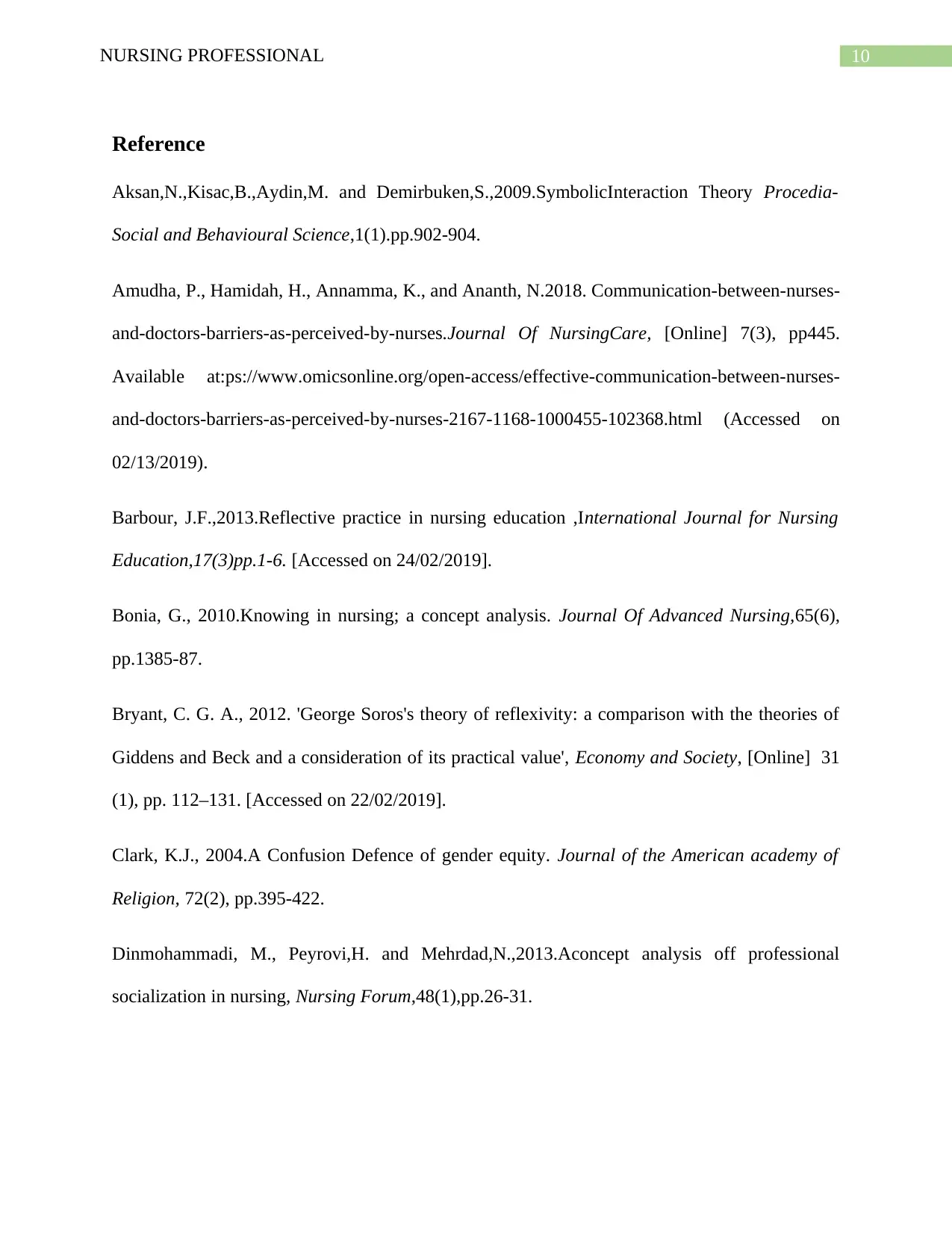
10NURSING PROFESSIONAL
Reference
Aksan,N.,Kisac,B.,Aydin,M. and Demirbuken,S.,2009.SymbolicInteraction Theory Procedia-
Social and Behavioural Science,1(1).pp.902-904.
Amudha, P., Hamidah, H., Annamma, K., and Ananth, N.2018. Communication-between-nurses-
and-doctors-barriers-as-perceived-by-nurses.Journal Of NursingCare, [Online] 7(3), pp445.
Available at:ps://www.omicsonline.org/open-access/effective-communication-between-nurses-
and-doctors-barriers-as-perceived-by-nurses-2167-1168-1000455-102368.html (Accessed on
02/13/2019).
Barbour, J.F.,2013.Reflective practice in nursing education ,International Journal for Nursing
Education,17(3)pp.1-6. [Accessed on 24/02/2019].
Bonia, G., 2010.Knowing in nursing; a concept analysis. Journal Of Advanced Nursing,65(6),
pp.1385-87.
Bryant, C. G. A., 2012. 'George Soros's theory of reflexivity: a comparison with the theories of
Giddens and Beck and a consideration of its practical value', Economy and Society, [Online] 31
(1), pp. 112–131. [Accessed on 22/02/2019].
Clark, K.J., 2004.A Confusion Defence of gender equity. Journal of the American academy of
Religion, 72(2), pp.395-422.
Dinmohammadi, M., Peyrovi,H. and Mehrdad,N.,2013.Aconcept analysis off professional
socialization in nursing, Nursing Forum,48(1),pp.26-31.
Reference
Aksan,N.,Kisac,B.,Aydin,M. and Demirbuken,S.,2009.SymbolicInteraction Theory Procedia-
Social and Behavioural Science,1(1).pp.902-904.
Amudha, P., Hamidah, H., Annamma, K., and Ananth, N.2018. Communication-between-nurses-
and-doctors-barriers-as-perceived-by-nurses.Journal Of NursingCare, [Online] 7(3), pp445.
Available at:ps://www.omicsonline.org/open-access/effective-communication-between-nurses-
and-doctors-barriers-as-perceived-by-nurses-2167-1168-1000455-102368.html (Accessed on
02/13/2019).
Barbour, J.F.,2013.Reflective practice in nursing education ,International Journal for Nursing
Education,17(3)pp.1-6. [Accessed on 24/02/2019].
Bonia, G., 2010.Knowing in nursing; a concept analysis. Journal Of Advanced Nursing,65(6),
pp.1385-87.
Bryant, C. G. A., 2012. 'George Soros's theory of reflexivity: a comparison with the theories of
Giddens and Beck and a consideration of its practical value', Economy and Society, [Online] 31
(1), pp. 112–131. [Accessed on 22/02/2019].
Clark, K.J., 2004.A Confusion Defence of gender equity. Journal of the American academy of
Religion, 72(2), pp.395-422.
Dinmohammadi, M., Peyrovi,H. and Mehrdad,N.,2013.Aconcept analysis off professional
socialization in nursing, Nursing Forum,48(1),pp.26-31.
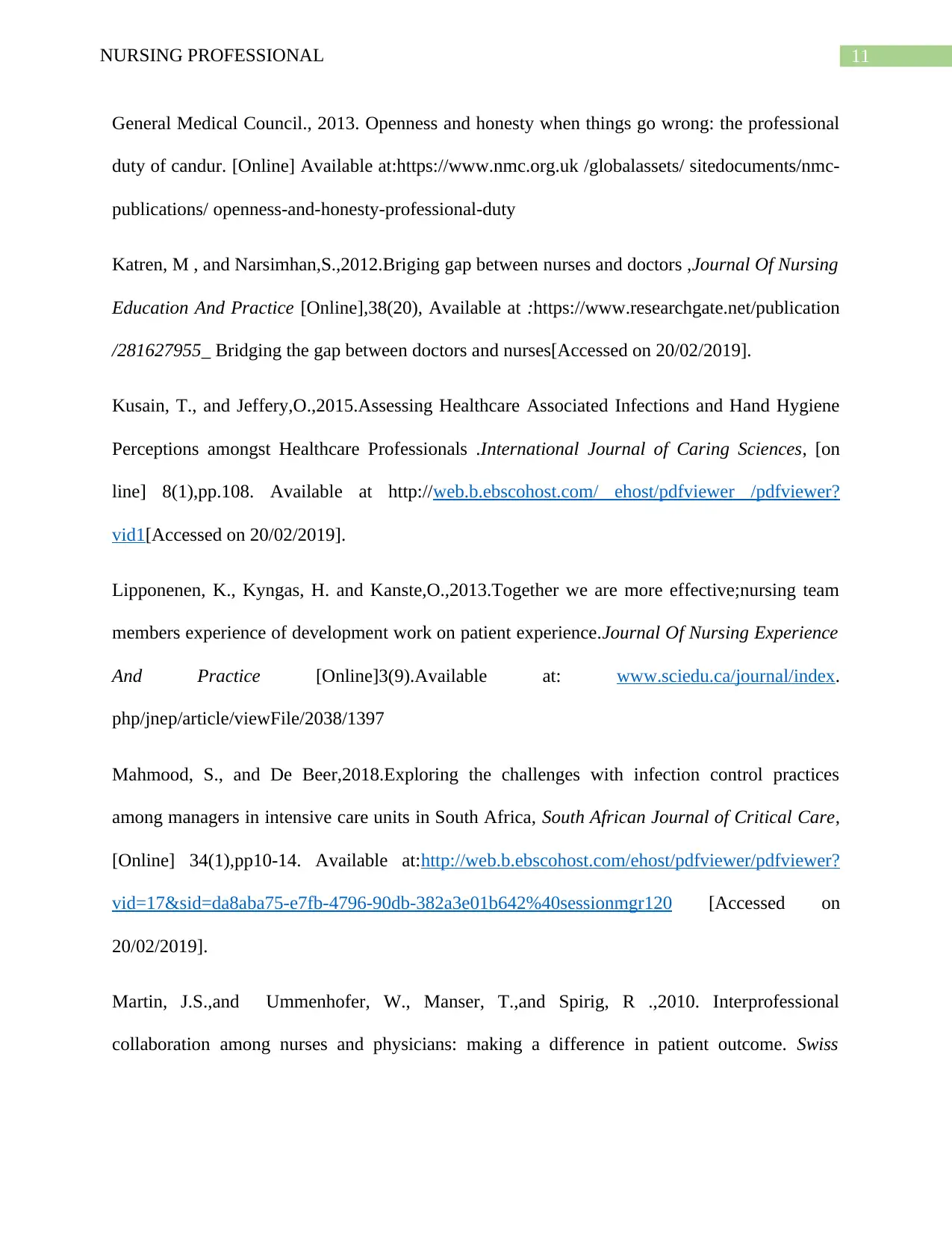
11NURSING PROFESSIONAL
General Medical Council., 2013. Openness and honesty when things go wrong: the professional
duty of candur. [Online] Available at:https://www.nmc.org.uk /globalassets/ sitedocuments/nmc-
publications/ openness-and-honesty-professional-duty
Katren, M , and Narsimhan,S.,2012.Briging gap between nurses and doctors ,Journal Of Nursing
Education And Practice [Online],38(20), Available at :https://www.researchgate.net/publication
/281627955_ Bridging the gap between doctors and nurses[Accessed on 20/02/2019].
Kusain, T., and Jeffery,O.,2015.Assessing Healthcare Associated Infections and Hand Hygiene
Perceptions amongst Healthcare Professionals .International Journal of Caring Sciences, [on
line] 8(1),pp.108. Available at http://web.b.ebscohost.com/ ehost/pdfviewer /pdfviewer?
vid1[Accessed on 20/02/2019].
Lipponenen, K., Kyngas, H. and Kanste,O.,2013.Together we are more effective;nursing team
members experience of development work on patient experience.Journal Of Nursing Experience
And Practice [Online]3(9).Available at: www.sciedu.ca/journal/index.
php/jnep/article/viewFile/2038/1397
Mahmood, S., and De Beer,2018.Exploring the challenges with infection control practices
among managers in intensive care units in South Africa, South African Journal of Critical Care,
[Online] 34(1),pp10-14. Available at:http://web.b.ebscohost.com/ehost/pdfviewer/pdfviewer?
vid=17&sid=da8aba75-e7fb-4796-90db-382a3e01b642%40sessionmgr120 [Accessed on
20/02/2019].
Martin, J.S.,and Ummenhofer, W., Manser, T.,and Spirig, R .,2010. Interprofessional
collaboration among nurses and physicians: making a difference in patient outcome. Swiss
General Medical Council., 2013. Openness and honesty when things go wrong: the professional
duty of candur. [Online] Available at:https://www.nmc.org.uk /globalassets/ sitedocuments/nmc-
publications/ openness-and-honesty-professional-duty
Katren, M , and Narsimhan,S.,2012.Briging gap between nurses and doctors ,Journal Of Nursing
Education And Practice [Online],38(20), Available at :https://www.researchgate.net/publication
/281627955_ Bridging the gap between doctors and nurses[Accessed on 20/02/2019].
Kusain, T., and Jeffery,O.,2015.Assessing Healthcare Associated Infections and Hand Hygiene
Perceptions amongst Healthcare Professionals .International Journal of Caring Sciences, [on
line] 8(1),pp.108. Available at http://web.b.ebscohost.com/ ehost/pdfviewer /pdfviewer?
vid1[Accessed on 20/02/2019].
Lipponenen, K., Kyngas, H. and Kanste,O.,2013.Together we are more effective;nursing team
members experience of development work on patient experience.Journal Of Nursing Experience
And Practice [Online]3(9).Available at: www.sciedu.ca/journal/index.
php/jnep/article/viewFile/2038/1397
Mahmood, S., and De Beer,2018.Exploring the challenges with infection control practices
among managers in intensive care units in South Africa, South African Journal of Critical Care,
[Online] 34(1),pp10-14. Available at:http://web.b.ebscohost.com/ehost/pdfviewer/pdfviewer?
vid=17&sid=da8aba75-e7fb-4796-90db-382a3e01b642%40sessionmgr120 [Accessed on
20/02/2019].
Martin, J.S.,and Ummenhofer, W., Manser, T.,and Spirig, R .,2010. Interprofessional
collaboration among nurses and physicians: making a difference in patient outcome. Swiss
⊘ This is a preview!⊘
Do you want full access?
Subscribe today to unlock all pages.

Trusted by 1+ million students worldwide
1 out of 15
Related Documents
Your All-in-One AI-Powered Toolkit for Academic Success.
+13062052269
info@desklib.com
Available 24*7 on WhatsApp / Email
![[object Object]](/_next/static/media/star-bottom.7253800d.svg)
Unlock your academic potential
Copyright © 2020–2026 A2Z Services. All Rights Reserved. Developed and managed by ZUCOL.





